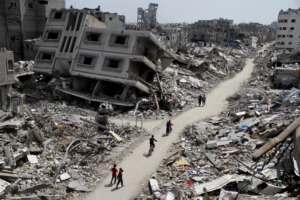Gloom about the ‘day after’ the Gaza war pervasive among Mideast scholars

Palestinians walking and cycling past the ruins of buildings destroyed during Israel’s military offensive, northern Gaza Strip, 31 March 2024
Marc Lynch and Shibley Telhami write on the Brookings Institution website on 20 June 2024:
Even before a lasting ceasefire in the Gaza Strip could be attained, the Biden administration has avowed the need to return to the eventual goal of a two-state solution as the foundation of a durable Israeli-Palestinian settlement. But a new survey of Middle East scholars who study the issue suggests that finding such a solution out of the horrific devastation of Gaza is highly unlikely.
The latest round of the Middle East Scholar Barometer that we co-direct, with over 750 mostly U.S.-based respondents, reveals that few scholars believe that advancing a two-state solution in the foreseeable future is a realistic option, and a large majority believe that war in Israel and Gaza is likely to lead to new large-scale, long-term displacement of Palestinians from Gaza and/or the West Bank. The Biden administration’s policy gets failing grades from the scholars: More than three-quarters say President Joe Biden’s policy negatively impacts the prospects of peace in Israel and Palestine, U.S. interests in the Middle East, and America’s standing in the world.
This unique survey probes opinions on timely issues of Middle East experts from the American Political Science Association, the Project on Middle East Political Science, the American Historical Association, and the Middle East Studies Association (MESA), which we have been conducting on a biannual basis for more than three years. Most of our list and our respondents are political scientists, as are the two of us and the six-member advisory committee. The latest round was conducted from May 23 to June 6. Notably, we found few significant differences between MESA members and those who are not, and between political scientists and other scholars, suggesting that the scholars’ views are not on the whole dependent on their academic discipline or their organizational membership. As we have recently reported in the Chronicle of Higher Education, over 80% of U.S. based scholars say they self-censor when discussing the Israeli-Palestinian issue professionally, mostly speech critical of Israel.
The nature of the war in Gaza and Israeli aims
Nearly three-quarters of the scholars surveyed, about 72%, expect the war to result in new mass displacements of Palestinians outside of Gaza and the West Bank. This expectation seems partly based on the scholars’ gloomy assessment of Israel’s motives: A majority, about 57%, see making Gaza uninhabitable in order to force Palestinian removal as a primary Israeli objective of the war. About 15% each see Israel’s primary objective to be keeping the current Israeli government in office or destroying Hamas. Few (about 4%) say Israel’s operation is justified by the right of self-defense.
